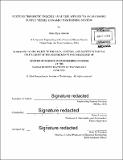Systems Theoretic Process Analysis applied to an Offshore Supply Vessel dynamic positioning system
Author(s)
Abrecht, Blake Ryan
DownloadFull printable version (12.91Mb)
Alternative title
STPA applied to an OSV dynamic positioning system
Other Contributors
Massachusetts Institute of Technology. Engineering Systems Division.
Advisor
Nancy Leveson.
Terms of use
Metadata
Show full item recordAbstract
This research demonstrates the effectiveness of Systems Theoretic Process Analysis (STPA) and the advantages that result from using this new safety analysis method compared to traditional techniques. To do this, STPA was used to analyze a case study involving Naval Offshore Supply Vessels (OSV) that incorporate software-intensive dynamic positioning in support of target vessel escort operations. The analysis begins by analyzing the OSVs in the context of the Navy's organizational structure and then delves into assessing the functional relationship between OSV system components that can lead to unsafe control and the violation of existing safety constraints. The results of this analysis show that STPA found all of the component failures identified through independently conducted traditional safety analyses of the OSV system. Furthermore, the analysis shows that STPA finds many additional safety issues that were either not identified or inadequately mitigated through the use of Fault Tree Analysis and Failure Modes and Effects Analysis on this system. While showing the benefit of STPA through this case study, other general advantages that STPA has relative to traditional safety analysis techniques are also discussed. First, this thesis discusses how STPA generates results that are completely compliant with the requirements for system hazard analysis set forth in MIL-STD-882E and that STPA more completely satisfies the tasks in MIL-STD-882E than traditional safety analysis techniques. Next, the link between STPA and Causal Analysis using Systems Theory- (CAST), two Systems Theoretic Application and Model Processes (STAMP) tools is discussed to highlight how using STPA for hazard analysis benefits subsequent accident investigations using the CAST framework.
Description
Thesis: S.M. in Engineering Systems, Massachusetts Institute of Technology, School of Engineering, Institute for Data, Systems, and Society, 2016. Cataloged from PDF version of thesis. Includes bibliographical references (page 84).
Date issued
2016Department
Massachusetts Institute of Technology. Engineering Systems Division; Massachusetts Institute of Technology. Institute for Data, Systems, and SocietyPublisher
Massachusetts Institute of Technology
Keywords
Institute for Data, Systems, and Society., Engineering Systems Division.